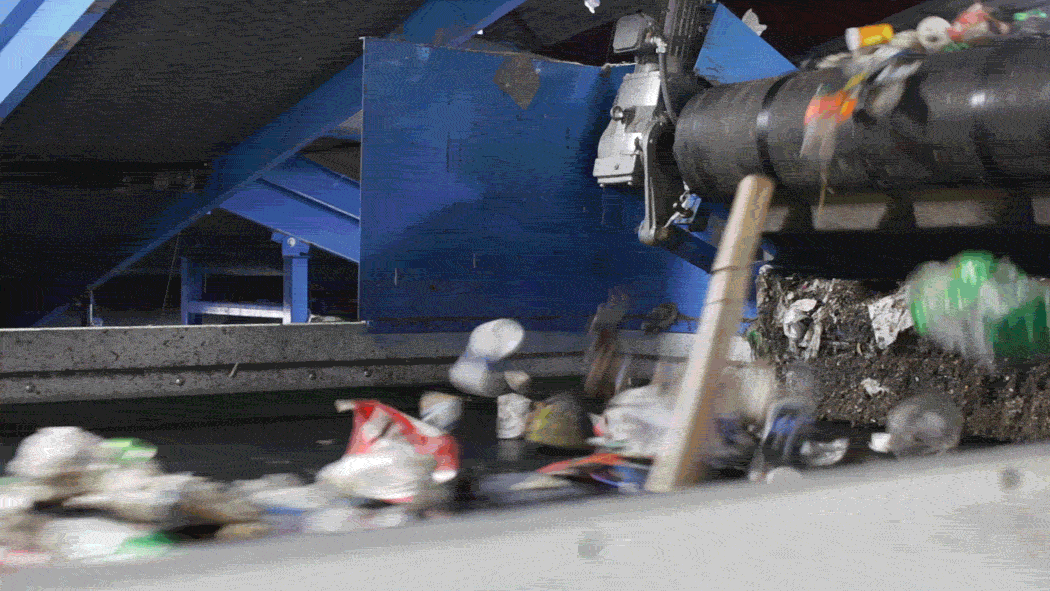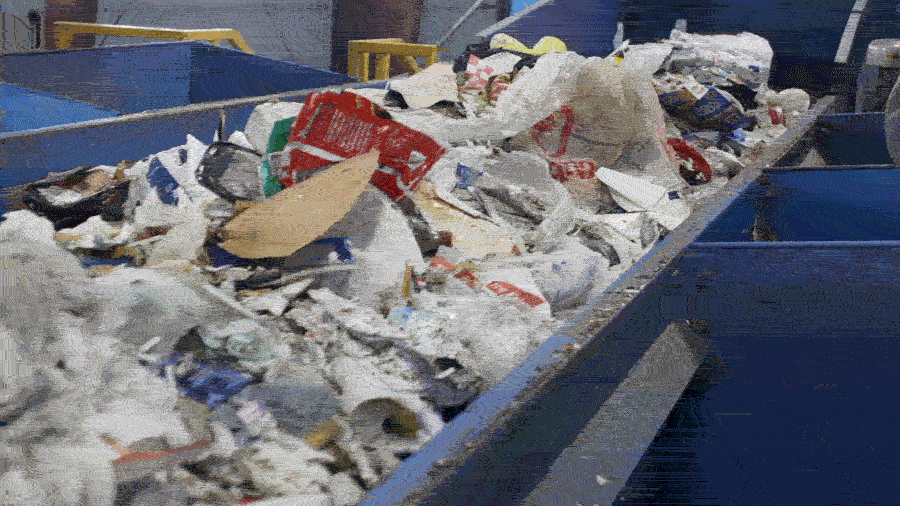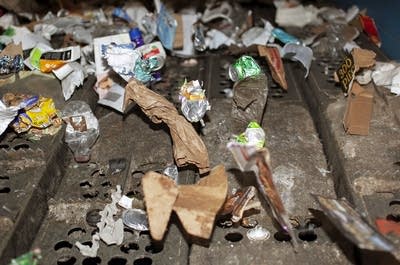NW Minn. counties make innovative bet on recycling

Soda bottles, milk jugs and all kinds of plastic containers zip along a conveyor belt in a big warehouse just west of Fosston. As each item breaks a light beam, an optical scanner decides what kind of plastic it is, triggers a burst of air and blows the item onto another conveyor belt that carriers different kinds of plastic to individual storage bins.
Each decision takes the machine a millisecond.
"For us to do this manually would probably take about 10 people, and they wouldn't be able to keep up," said Jon Steiner, who manages the whole operation as Polk County's environmental services administrator. "Machines don't get tired."
When a truckload of garbage or recycling is dumped on the concrete floor of the Polk County Materials Recovery Facility, it starts a bouncing, spinning, sliding journey that ends with recyclable material neatly stored in bins and garbage reduced to ash in an incinerator.
Create a More Connected Minnesota
MPR News is your trusted resource for the news you need. With your support, MPR News brings accessible, courageous journalism and authentic conversation to everyone - free of paywalls and barriers. Your gift makes a difference.
Polk County's operation takes an innovative approach to dealing with trash. It handles refuse from five other counties, and in addition to sorting waste that residents have recycled, it also pulls recyclables out of waste they haven't, and turns garbage into energy.
"Between what gets reused and what goes to market to be recycled, you're looking at about 20 to 25 percent of the material that comes in the door gets used again or recycled," said Steiner.
It's one of a handful of similar collaboratives around the state, and the counties involved are betting it will be cheaper in the long term to recycle more — and then burn the remaining trash — rather than simply burying everything that's thrown away.

A recent $8 million upgrade to the operation's equipment has allowed it to speed up its process and pull cans and plastic containers out of garbage. Steiner said it's the only facility in the state that uses the same equipment to sort recycling and garbage.
The recycled materials are sold, what's left is incinerated, and the ash that remains is used in road construction or dumped in a landfill. The incinerator part of the process isn't new. It's been burning trash for decades — and generating steam that's sold to businesses in the Fosston industrial park, who use it to process vegetables or heat buildings.
But adding the new sorting equipment is a step that will increase the amount of material pulled out of the garbage. More recycling will also make it easier to manage air pollution from the incinerator, Steiner said, because the remaining garbage burns cleaner.
And it's nearly all automated, from the optical scanner to the conveyor belts that use magnetic fields to attract metal and push away aluminum.
Along the way there are humans, too. They remove unexpected trash that might damage the equipment, like bowling balls or plasterboard. And they do quality control, catching any mistakes the machines make.
The sorting equipment might run material from recycling bins for a couple of hours, sorting the cardboard, paper, metal and plastic into bins where it's baled for sale to companies that reuse the material.

Then the line switches to running garbage, which is harder to sort: Paper can't be pulled out of the stream and sent to be recycled, and like cardboard, it's usually wet and dirty. Plastic pop bottles are sometimes filled with disgusting stuff which, if recycled, might prompt the companies that buy the compressed plastic to reject an entire bale of pop bottles.
"They don't want to have a bunch of cigarette butts, they don't want to have a bunch of chewing tobacco spit," Steiner said. "And the same thing with food cans. If you start pulling out full cans of beans and you squish it in the baler, now everything's full of beans. They really don't want to see that level of contamination in there."
So the machines reject a lot of potentially recyclable materials from the garbage stream because they're dirty. That means individual recycling efforts are still really important, Steiner said.
The Polk County facility handles recycling and garbage from Beltrami, Clearwater, Hubbard, Mahnomen and Norman counties. Managing trash this way gives them an incentive to recycle.
"We've aligned for each of the counties in our group that recycling is more preferred than disposal because it costs less," Steiner said. "Instead of paying a tip fee and then tax on their waste, if they put the recycle stream, it comes here, it gets processed and doesn't cost them anything."
It would be cheaper to simply dump all the trash in a landfill, but Steiner said county officials have decided that recycling and incineration will save money in the long term. The facility itself is designed to be financially self-supporting through the fees counties pay for each load of garbage, and through selling the sorted recyclables and the steam the whole operation generates.
There are a handful of other garbage incinerators around Minnesota. And Sigurd Scheurle, solid waste planner for the Minnesota Pollution Control Agency, thinks the Polk County facility is a model for counties working together to recycle and turn garbage into energy, instead of burying it in the ground.
"Unfortunately, landfills are still cheaper," Scheurle said. Processing garbage takes machines, people and big buildings, all costly. Burying a load of garbage is simpler and cheaper in the short term. The savings that a process like this one brings are long term.

"The problem is that as the years go by we don't stop paying for landfills," said Scheurle. "They have to have perpetual care, and unfortunately many of them leak, and so they put our groundwater at risk."
Scheurle said incinerator ash is much less reactive than garbage when it's buried, and unlikely to contaminate groundwater in the future.
He said he's hopeful that more counties, many of which handle their own recycling, will take a long-term view of the cost of landfills and shift to the model established by multi-county facilities like the one in Fosston.
For his part, Steiner has been getting a lot of calls from county officials and others who want to know more about the Polk County facility. He recently bought new communication headsets for visitors to use during tours through the crunch, crackle and pop of the garbage sorting machines.


